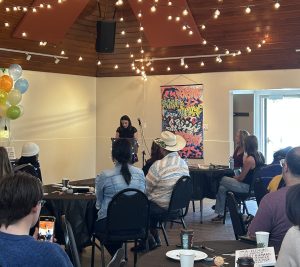Kari’s eviction notice came swiftly. She had a month to find new accommodations for her and her adult sons with special needs. Unsure how she could find a place on such short notice, Kari considered all her options, from living in a storage unit to even living in her car. Then she remembered a community organization.
“I knew about Bissell Centre—I worked with Bissell Centre while teaching a crafting course,” Kari says. Despite her prior knowledge of the organization, Kari was surprised to learn about the Community Bridge program and how it could help her secure a new home.
As part of the Community Bridge program, Kari was given a $2,000 open-ended, interest-free loan to cover her damage deposit and rent, which she paid back proudly. “I wanted to make sure that resource was there and ready for the next person who needed help.”
A Kokum’s Giving Spirit
This giving spirit is typical for Kari – whose community frequently refers to her as the Community Kokum, or grandmother, providing love, support, and guidance whenever and wherever she can. Even when her pantry was empty and her power shut off, Kari still looked after others and considered her situation manageable.
“I’ve had to flee domestic violence,” says Kari. “While in the shelters, I saw many women in similar situations and how much worse off I could have been. I never saw myself as a victim. I have a lot of resilience that’s helped me through some tough times.”
Prior to reaching out to Community Bridge, Kari faced many uphill battles – especially when it came to where she called home. Kari has moved four times in four years through low-income housing and encountered varying levels of domestic violence and abuse. She’s also struggled with her adult children’s special needs, experienced houselessness while seven months pregnant and underwent multiple medical procedures. Kari tried to push through it without any outside help, but when she needed assistance, she knew Bissell Centre would be there with solutions. However, Kari wasn’t expecting this amount of support from Bissell Centre’s Community Bridge.
“Everything with Community Bridge was no pressure and fell into place seamlessly,” Kari explains. “It took two weeks to learn I had a loan and two weeks after that, I secured my place. I took possession of my new home before I moved out of the last place.”
How Community Bridge Helped Kari
The Community Bridge program is essential to Bissell Centre’s operations. Between April 2022 and March 2023, the Community Bridge program prevented 511 individuals from housing-loss, resulting in 214 households served, with another 202 households assisted with loans. Ensuring people don’t lose their homes and experience houselessness is the team’s top priority – so the first place they look to help folks out is with their current landlords. The team negotiates on behalf of the people they’re helping to prevent any untimely evictions.
When landlords are unable to negotiate any further and eviction is imminent, Community Bridge Support Workers then work directly with the people who need a new place to live, helping make the transition to their new place as seamless as possible.
Partners Make These Programs Possible
A program like this wouldn’t be possible without our partners in the community, like ENMAX. Their support has been crucial for Community Bridge to help people find places to call home.
And as Kari points out, it’s not just finding and funding new spaces that makes this program indispensable – it’s the regular follow-ups and wraparound services that have helped keep her and her family in their new home.
“I think more people should check out Bissell Centre to know what it has to offer,” says Kari. “Without Community Bridge, I would be experiencing houselessness. I never thought I would be in that position. Bissell Centre made sure I still had a place my sons and I could call home.”
Individuals connected to our Fetal Alcohol Spectrum of Services (FASS) program contributed to a book about the challenges and realities of navigating life with Fetal Alcohol Spectrum Disorder (FASD). Under the guidance of Jared Epp, Carleton University PhD candidate and former housing support worker with Bissell Centre, who facilitated the group in sharing stories of what was most important to them. Fifteen people shared their stories, captured in this captivating collection. Born Broken is a book that’s an immersive experience into what it means to have FASD and the barriers it can create.

The group celebrated the release of this Born Broken book this past month with a small and intimate reading and sharing. Everyone who contributed to the book received a copy, and a few were shared around the community to help spread its positive message.
Copies of Born Broken books are available to purchase from the Bissell Thrift Shop on 118 Avenue or Paper Birch Books at 10825 95 Street.
Below is the preface to the book, written by Jared Epp. This firsthand experience of seeing the collection come together illuminated the importance of this book for the contributors and for those about to read it and gain a better understanding of FASD.

Preface from Born Broken
A group of individuals connected to Bissell Centre’s Fetal Alcohol Spectrum of Services (FASS) came together for a book project. The goal was to provide an opportunity for folks to share whatever kind of content they wanted. Leaving it open-ended allowed the individuals participating in the project to share what was meaningful to them. Their contributions didn’t have to only be about living with Fetal Alcohol Spectrum Disorder (FASD). A number of contributors did want to share their stories about living with FAD, about their daily challenges, as well as the impact of receiving their diagnosis. Others talked about different things. There are stories about adventure on Edmonton’s public transit, sewing denim, dreaming, making music and art, the challenges of finding and keeping a job and many other events and situations the reader will soon encounter.
Woven throughout the book are stories, ideas, frustrations, thoughts and reflections, offering a window into the experience of entering into the world a certain way.
In our last group meeting, we had to come up with a title for the book. Each contributor present was invited to come up with some titles, and then there would be a vote.
These were the title ideas:
- Born Broken
- The Struggle is Real
- Drumbeats of Hope
- Light in the Dark
- Perfectly Imperfect
- Getting Dealt a Bad Hand
Everyone had agreed on Heidi’s subtitle, “Reflections on Life and Resiliency from Individuals living with FASD,” as it put a positive spin on the main title.
Born Broken won by one vote over The Struggle is Real and Light in the Dark. There was a lot of discussion and debate on the chosen title. Some people felt it was too negative, but they also acknowledged it’s sentiment. In many ways, the titles and the debate around it set a theme that echoes through each story: individuals confronting and overcoming something they were born with, have no control over, and yet seems invisible to those outside the lived experience of FASD. The reader is invited to encounter the diverse contributions within the book, keeping in mind the unsettled nature of its title and the realities of living with FASD.
-Jared Epp

Overview
Working with a diverse community means encountering a diverse set of challenges – oftentimes, these are the very challenges that lead these folks into experiencing poverty. Often, when someone is experiencing homelessness, they’re also struggling with mental illness. In fact, according to The Homeless Hub, 30 to 35 per cent of those experiencing homelessness report mental health issues.
Bissell Centre’s support workers are trained and skilled at working with folks managing an array of mental health challenges. While diagnoses and treatments are best left to medical professionals, support workers’ expertise lies in helping folks manage the immediate surfacing symptoms of the mental illness they are experiencing.
For Mental Health Month, we’re taking a look at the most prevalent mental health indicators seen – and how our Mental Health program and support workers help our community members with the immediate challenges they face.
Bissell Centre’s Mental Health Program
Bissell Centre mental health support staff work as advocates for folks experiencing mental health complications. Oftentimes, community members struggle to navigate our health care system – or worse, have seen family and friends fall through the cracks. They may also have their own trauma and now distrust the health care system.
This service to community members goes far beyond helping with immediate crises. Support workers will continue reaching out to community members they helped and accompany them to appointments and help them be comfortable enough to voice their experience and advocate for themselves.
The main difference is the trust we build with our community members. While folks have their reasons to distrust establishments, we can overcome that barrier with one-to-one connections, supportive conversations, and mapping out a strategy for reaching whatever goals folks might have.
Most Common Mental Health Issues we see
Whether it’s a pre-existing condition, instigated from trauma, a result of substance use, or a combination of all these factors, Bissell Centre works with a lot of different mental health experiences – mainly as they outwardly present. Again, any further assessments are better left to mental health professionals.
Our support workers help folks manage their immediate crises: this can include anger and agitation, hallucinations and dissociation, thoughts of self-harm and suicide, or any other immediate challenge the community member needs to work through.
Bissell has a Mental Health program that works directly with those in need. However, so many of our case workers in other programs, including FASS, Housing, Family Services, and Case Management also provide ongoing supports to community members. We find we have the most success when we collaborate as the many elements of houselessness are so entwined.
While Bissell Centre isn’t a cure for mental health, it’s easily one of the best first stops someone can make when they’re working through mental health issues. Our support workers are well-versed in Alberta’s health system – and how best our community members can get the help they need to move out of poverty and find their prosperity.
It’s no surprise that being without a home can weigh heavily on the mind and heart. Homelessness implies more than simply lacking physical necessities; it can also have a debilitating effect on mental, emotional, and spiritual well-being. People who are homeless deal with circumstances that most of us can hardly imagine, and it’s important to remember that not every side effect of homelessness is directly visible to the eye. Mental illness is experienced by roughly one-third of the homeless community, and is a major barrier to getting off the streets.
Homelessness is stressful.
For those who are homeless, every new day marks the beginning of another struggle to find a place to sleep, enough food to get by on, or shelter from the elements. The pressures that they face to secure their own survival every day are unimaginable for most of us, and can be incredibly stressful. Exposure to substance abuse, crime, and domestic violence is common among the homeless community only add to the stress.
Homelessness is isolating.
Many people become homeless as a result of the loss of a loved one or a relationship breakdown. People without strong support networks can have a difficult time overcoming such traumatic events, which can then lead to a cycle of isolation, and potentially towards homelessness. Since there are few places people who are homeless can go where they are welcome, a third of them spend their entire day alone.
Homelessness is depressing.
Rates of depression and suicide among homeless people are much higher than in the general population. According to the Canadian Population Health Initiative, up to 61% of homeless adults experience suicidal thoughts. Confidence and self-esteem are inevitably diminished by homelessness. The feelings of defeat and worthlessness that so often accompany homelessness can be crippling, and can prevent people from seeking help.
Homelessness hurts, but there are ways to help.
At Bissell Centre, we offer mental health services to people in our community who need it most. Our program provides immediate, short-term support for those with mental health concerns. For longer-term support, we partner with Alberta Health Services to connect participants with qualified psychiatrists, doctors, and other health professionals in our community, bringing them one step closer to getting off the streets.
The journey to health and recovery is not always an easy one, but here at Bissell Centre, we make sure that nobody has to walk it alone.
Learn more about our Mental Health Services.



